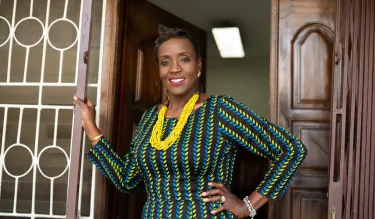Seed Spark Expands Across South Asia
Stanford Seed’s online program has already proven it can accelerate early-stage startups and scale impact. Next, it’s expanding in South Asia.
February 18, 2022

Seed Spark, Stanford Seed’s online entrepreneurship program for early-stage founders in India, has expanded across South Asia to Pakistan and Bangladesh.
And the program isn’t stopping there: for 2022, Spark is being introduced in Sri Lanka and Nepal, as Seed seeks to bring Silicon Valley innovation and entrepreneurship to even more burgeoning startup ecosystems in emerging markets. It will do this by leveraging expert mentors and by employing technology to expand access to courses on business and leadership, all designed by world-renowned Stanford faculty and local business practitioners.
“Through our three pioneer cohorts in 2020 and 2021, we received overwhelmingly positive feedback that Seed Spark helps entrepreneurs running early-stage startups to create solid foundations for their venture and develop the right mindset to grow exponentially,” said Dinesh Kumar, Spark’s blended learning program manager. “Seed Spark provides a platform for entrepreneurs, mentors, and entrepreneurship support organizations to be part of the South Asian entrepreneurial ecosystem, strengthened by trust and value.”

One example is Sadaf Rehman, the co-founder of Codeschool.pk in Pakistan. The organization provides coding classes for children to promote important but overlooked skills like problem-solving, creativity, and resilience. These are among the skills that she believes are missing in Pakistan’s educated youth, 31 percent of whom are unemployed. Upskilling is a potential economic game changer in a country where 60 percent of the population is under 30, she said. But Rehman was concerned about taking the young company to the next stage of growth.
“I just assumed that if the product was good, everyone would sign up,” she said. “I hit this inflection point where I maxed out the social circle that had heard of us. I needed to get better at articulating our value proposition to unlock scale. I needed help.”
Today, she is boldly tackling those challenges after successfully completing Spark in January 2022. The online program provided her with tools to build her strategy, grow her network, and, ultimately, boost her business through an action-based curriculum, networking opportunities with peers, one-on-one mentorship, live expert-sessions, and a pitch challenge.
“I’ve done my MBA, so it’s not like the frameworks were new or I hadn’t heard of them, but applying them to my business, running it by our peers, the mentor, and getting feedback — that exercise was just immensely valuable,” Rehman said.
Her peers advised her to pursue a target audience shift, gearing her sales and marketing efforts towards schools, rather than through online channels. This substantially increased the size of the target market, given Pakistan’s internet penetration stands at 54 percent, compared with 90 percent in developed countries. “We found that many parents didn’t even know about us,” Rehman said.
She also benefited from Seed’s collaboration with a broad array of business incubators and other entrepreneurial support organizations. Admission for Spark is conducted through these official collaborators, not directly through Stanford Seed. The collaborating organizations also nominate mentors for the program who are established business leaders who want to give back to society.
Saima Rana is director of learning and development at National Incubation Center Lahore, one of Spark’s collaborators in Pakistan. The program fills a training gap for seed and early-stage startups which need management skills, tools, and mindsets to grow and scale. “When Seed first reached out to us, it was immediately clear this would be a win-win collaboration,” Rana said. “I’m still very far from curating a program of this quality myself, as I don’t have the resources.”
The program provides a world-class curriculum from Stanford Graduate School of Business and the innovative thinking that has shaped some of the most successful companies in Silicon Valley. Faculty, seasoned entrepreneurs from the region, and mentors all help Spark’s participants identify customer needs, prototype solutions, identify partners and markets that make up the value chain, build a business model and pricing strategy, and articulate their value proposition to the world.
The entrepreneurs also develop relationships with like-minded founders to share experiences and develop an ongoing peer support network. “It’s been immensely valuable for the founders because Stanford is a huge brand, and earning a certificate from the business school sends a signal to the external world that you are credible,” Rana said. “Spark will also increase the visibility of our center. The brand definitely resonates in this part of the world.”
At the end of the program, Spark hosts a pitch competition, which Rehman won. Additional finalists include Pranabesh Dash of Xplorazzi, which uses AI and computer vision to enable frictionless retail, and Sarika Pathak of Cresa Greentech, which is developing the world’s only hot water-dissolvable, plastic-free sanitary napkin.
Recruitment for Spark is conducted by collaborating incubators and entrepreneurial support organizations and not directly through Stanford Seed. If you’d like to participate in the program, please reach out to the collaborating organizations below. You can also sign up for our mailing list to receive information about programs for leaders of early-stage companies.
More Seed Stories
Stanford Seed Expands to Indonesia with the Seed Transformation Program

Stanford Seed Announces a Scholarship Fund for Early Stage African Entrepreneurs

Pacing Entrepreneurs to Success
